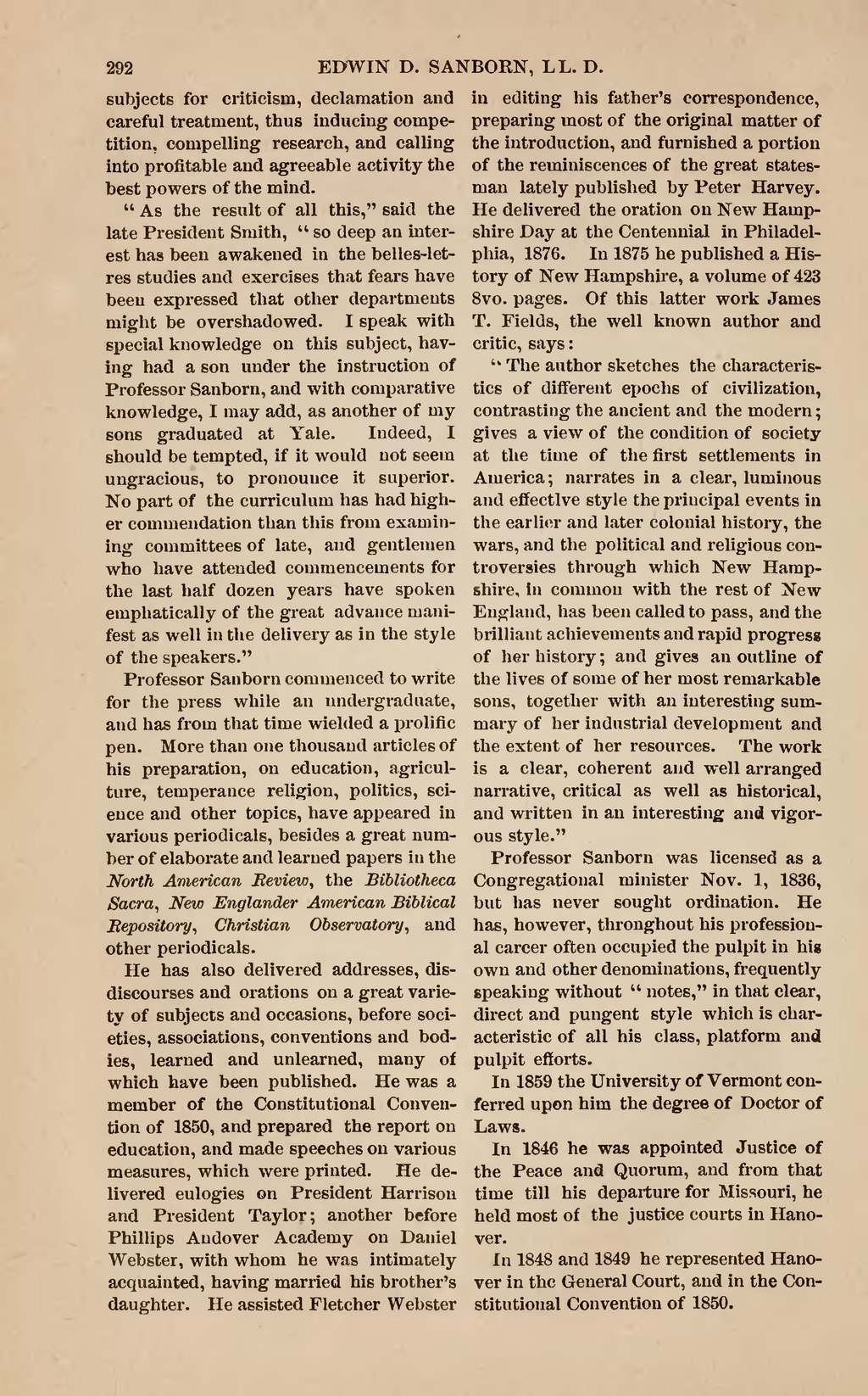292
��EDWIN D. SANBORN, LL. D.
��subjects for criticism, declamation and careful treatment, thus inducing compe- tition, compelling research, and calling into profitable and agreeable activity the best powers of the mind.
" As the result of all this," said the late President Smith, " so deep an inter- est has been awakened in the belles-let- res studies and exercises that fears have been expressed that other departments might be overshadowed. I speak with special knowledge on this subject, hav- ing had a son under the instruction of Professor Sanborn, and with comparative knowledge, I may add, as another of my sons graduated at Yale. Indeed, I should be tempted, if it would not seem ungracious, to pronounce it superior. No part of the curriculum has had high- er commendation than this from examin- ing committees of late, and gentlemen who have attended commencements for the last half dozen years have spoken emphatically of the great advance mani- fest as well in the delivery as in the style of the speakers."
Professor Sanborn commenced to write for the press while an undergraduate, and has from that time wielded a prolific pen. More than one thousand articles of his preparation, on education, agricul- ture, temperance religion, politics, sci- ence and other topics, have appeared in various periodicals, besides a great num- ber of elaborate and learned papers in the North American Review, the Bibliotheca Sacra, New Englander American Biblical Repository, Christian Observatory, and other periodicals.
He has also delivered addresses, dis- discourses and orations on a great varie- ty of subjects and occasions, before soci- eties, associations, conventions and bod- ies, learned and unlearned, many of which have been published. He was a member of the Constitutional Conven- tion of 1850, and prepared the report on education, and made speeches on various measures, which were printed. He de- livered eulogies on President Harrison and President Taylor; another before Phillips Andover Academy on Daniel Webster, with whom he was intimately acquainted, having married his brother's daughter. He assisted Fletcher Webster
��in editing his father's correspondence, preparing most of the original matter of the introduction, and furnished a portion of the reminiscences of the great states- man lately published by Peter Harvey. He delivered the oration on New Hamp- shire Day at the Centennial in Philadel- phia, 1876. In 1875 he published a His- tory of New Hampshire, a volume of 423 8vo. pages. Of this latter work James T. Fields, the well known author and critic, says :
'" The author sketches the characteris- tics of different epochs of civilization, contrasting the ancient and the modern ; gives a view of the condition of society at the time of the first settlements in America ; narrates in a clear, luminous and effective style the principal events in the earlier and later colonial history, the wars, and the political and religious con- troversies through which New Hamp- shire, in common with the rest of New England, has been called to pass, and the brilliant achievements and rapid progress of her history ; and gives an outline of the lives of some of her most remarkable sons, together with an interesting sum- mary of her industrial development and the extent of her resources. The work is a clear, coherent and well arranged narrative, critical as well as historical, and written in an interesting and vigor- ous style."
Professor Sanborn was licensed as a Congregational minister Nov. 1, 1836, but has never sought ordination. He has, however, thronghout his profession- al career often occupied the pulpit in his own and other denominations, frequently speaking without " notes," in that clear, direct and pungent style which is char- acteristic of all his class, platform and pulpit efforts.
In 1859 the University of Vermont con- ferred upon him the degree of Doctor of Laws.
In 1846 he was appointed Justice of the Peace and Quorum, and from that time till his departure for Missouri, he held most of the justice courts in Hano- ver.
In 1848 and 1849 he represented Hano- ver in the General Court, and in the Con- stitutional Convention of 1850.
�� �
